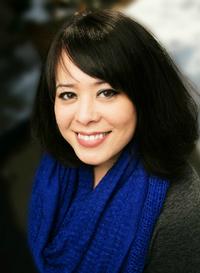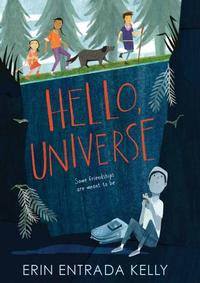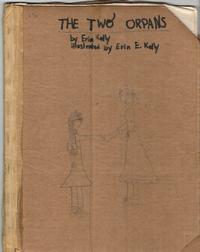Author Erin Entrada Kelly recently sat down with us in the Children's Literature Research Collection and spoke about illustration, cultural struggles, and how her childhood shaped her view as an author. As a result of our conversation, we're even more excited for Kelly's upcoming book, You Go First, which will be released in spring of 2018.
All of your novels – Blackbird Fly, The Land of Forgotten Girls, Hello, Universe, and the upcoming You Go First – feature main characters who feel isolated from their peers in one way or another; this is something that a lot of middle schoolers feel, and you’ve captured the complex emotions that result from that emotional confinement beautifully. How do you find these characters’ voices?
It’s easy, because I was all of those characters. Like Apple (Blackbird Fly), I was the only Asian in my school, and I felt distanced and resentful of my culture. Like Sol and Ming (The Land of Forgotten Girls), I lived a rich and insulated inner life without much money. And like Virgil, Valencia, and Kaori (Hello, Universe) and Charlotte and Ben (You Go First), I was interested in things that were different from my peers; endlessly curious about the world around me; and exceedingly self-conscious about my place in the world.
We've always wondered how much of your characters are a part of you, especially Apple. In Blackbird Fly we meet Apple, a twelve-year-old girl who is embarrassed by her family’s Filipino mother and her culture. As a Filipino-American who grew up in Louisiana, was this part of your childhood? What advice would you give to readers who also feel the need to "conform" to match their peers?
It was a substantial part of my childhood. This cultural struggle influenced my life in profound and significant ways. I looked different than all the other students at my school. My mother ate strange foods, sometimes with her hands, and she had a thick accent. I used to pray for God to unslant my eyes. I wished that I was a "real American" like everyone else.
All young people feel pressured to conform in some way. Some are better at resisting it than others. Unfortunately, I was convinced that I fell short of every standard. Because of that, I didn’t like myself very much. I spent an inordinate amount of time wishing I was someone else or somewhere else. There were many times when I wished I wasn’t anywhere at all. As an author, my number-one hope is that a young reader will find one of my books and realize they aren’t alone—and maybe, because of that, they’ll find strength to love and embrace who they are. Maybe—just maybe—they won’t have to suffer for years like I did. Instead, they’ll celebrate everything that makes them beautiful and unique, whether they’re the loudest kid on the block or the quietest.
We should all have the opportunity to be our authentic selves, and we shouldn’t have to suffer to get there. Unfortunately, many people do. Especially young people. My advice: love, celebrate, and recognize your authentic self and surround yourself with people who will celebrate with you. And if you can’t find those people, contact me. We’ll celebrate together.
Hello, Universe was one of our curator's favorite books of the past year. You switched up your narrative style a bit and had multiple narrators including Virgil, your first male main character, and Chet, a bully who’s home life is more complex than it initially appears. What were the challenges of having multiple narrators in one book?
What an incredible compliment! Thank you. It was a difficult book to write. I spent the last revision holed up in an airport hotel. It was only a few miles from home, but I needed a change of scenery. Just imagine me with my hair tangled in every direction, buried under stacks of red-lined manuscript pages, and reading aloud and muttering to myself. I think I even asked myself questions and answered them, like: "Does the pacing work in this chapter?" "I don’t know!"
Writing multiple narrators wasn’t that hard in and of itself, because all the characters’ voices came to me fully formed. I spend so much time with my characters before I write them; by the time they’re on the page, they’ve taken a life of their own. That said, there are many intricacies to the novel. All these threads that had to come together. And the pacing needed to be spot-on. Those were the details that had me talking to myself.
With Chet, I had much more trouble understanding what he had to say and how he viewed the world. Once I understood that, his voice came to me like all the others.
I can't image you as less that coiffed and perfect. You always look fantastic when I'm Instagram-stalking you. Speaking of, you’ve been posting a lot of sketches on Instagram lately. Are there any plans to illustrate as well as write?
Well, I started my career as an author/illustrator. I was eight years old at the time, but still. It would be nice to see that come to fruition. I love drawing. I have a lot to learn, but that’s one of the best things about life—there are always, always, always new things to learn. It would be incredible to see my illustrations in print, if ever they are worthy.
We love looking at them online! Make sure you're sharing them with your agent. Now here's the tough question: How do you deal with writer’s block?
Believe it or not, I don’t get writer’s block. For one thing, my brain never stops. Like, never. I have ten story ideas going on at the same time and fifteen ideas on how to execute them. I think about my characters constantly. I barrage my agent and editor with new ideas, some of which don’t make any sense. And I outline everything. Basically, I have the opposite problem: I have writer’s storm. It’s nice, but exhausting.
It sounds like it's a blessing and a curse! We can't wait to see what the next storm brings. Thank you Erin for your talking with us!
Have a question for Free Library staff? Please submit it to our Ask a Librarian page and receive a response within two business days.



